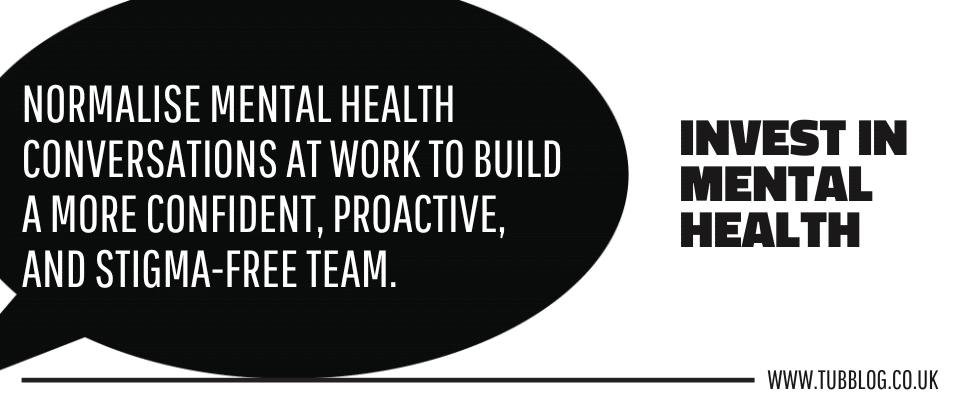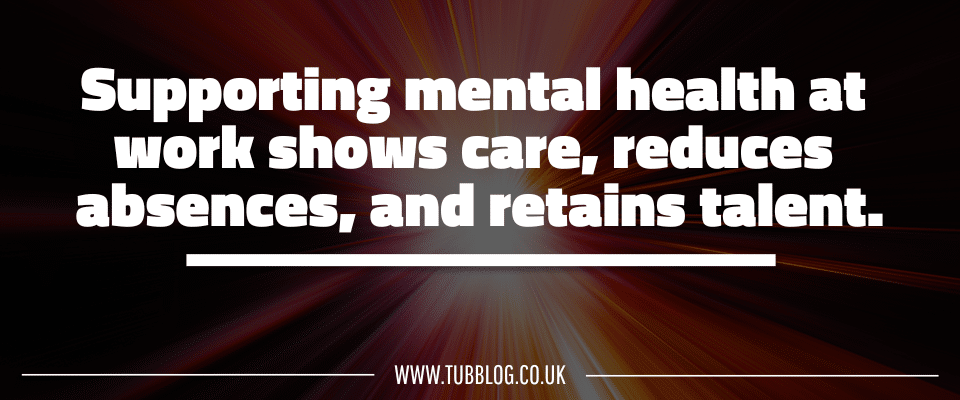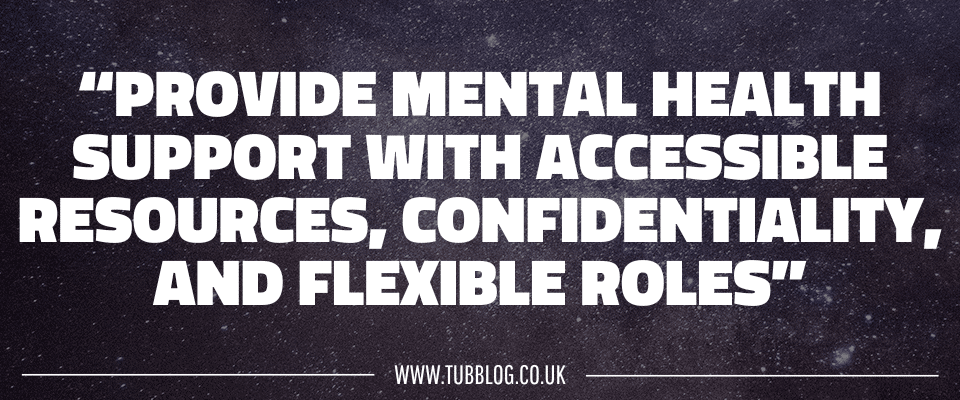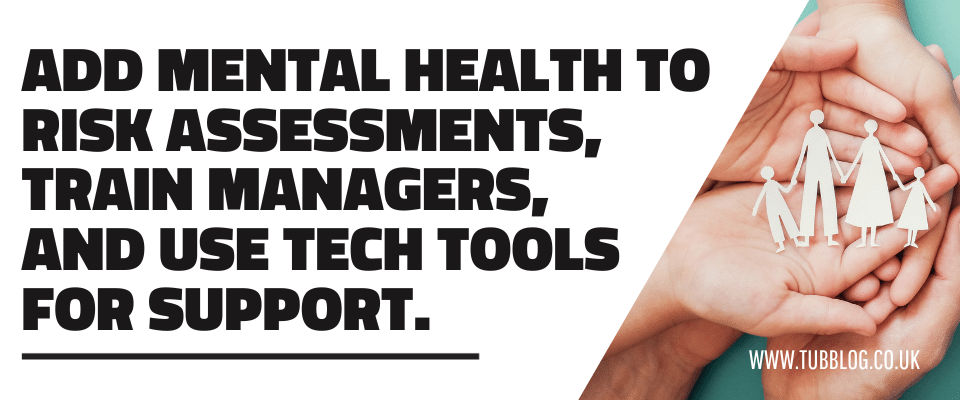Is your workplace a mentally healthy one? Sometimes, it’s not always so easy to tell from the outside. So how can MSPs prioritise mental health at work?
You might have a super-productive office, and you could be delivering a fantastic service to clients – but not everyone is so open to talking about how they’re genuinely feeling.
After all, running an MSP or even being part of a managed team can be tough at times. It’s not easy to just leave mental struggles and strong emotions to one side when you’re up against tough deadlines and increasing workloads.
It is, however, easy to forget about the importance of mental health and wellbeing when you’re faced with everyday pressures.
A mentally healthy workplace is one that’s happy, motivated, and truly committed to its values. However, it’s rare to find a workplace that has absolutely every single mental pressure ironed out and in check!
As part of our ongoing commitment to our readers, we’re helping MSP owners and operators take steps to think carefully about the stresses and struggles they might be going through – and those that could be affecting their teams, too.
And it’s important to know that TeamTubb practice what they preach. Mental health is an important topic for us. So much so, that Richard invests in an in-house mental health expert to support the team! You can find out more about the fabulous Polly Brennan on her website.
In fact, focusing on your workplace’s mental health is a genuine investment – and in this guide, I’ll share with you why that’s the case, and how you can start taking some fantastic steps to protect yourself and those you work with.
Why Invest in Mental Health at Work?
Let’s be clear. We all need help sometimes, and it’s never unhealthy, weak, or shameful to ask for it. We are beyond the age of simply bottling up and squashing down mental health struggles for the greater good.
If you ever feel depressed, anxious, exhausted, or overwhelmed at work – or, even outside of it – you are far from alone. Statistics from a couple of years ago show that around 875,000 of us struggle with work-related stress. That, of course, is also only the number of people who are open about it.
Of course, acknowledging that you aren’t alone in any problems you’re facing isn’t to downplay your struggle. It should, however, indicate that there is still a burgeoning need for people in UK workplaces to find more adequate support and guidance when it comes to mental health concerns.
That doesn’t always fall to you as a manager, nor does it fall to the individual employee! It does mean, however, that we could all benefit from more open conversations, and perhaps all be more willing to discuss how work affects our mental health, and vice-versa.
There are tons of great things you can do to support your teams – and yourself – when it comes to workplace mental health. I’ll run through these with you towards the bottom of this guide – and in the meantime, please do check out Richard’s fantastic guide to mental health resources for more insight.
Right now, however, let’s explore a few reasons why investing in mental health at work could be so beneficial for your business and the people who help you run it. Remember, investment doesn’t necessarily mean having to physically purchase or supply resources for your team – it could be as simple as just opening up a dialogue.
You’ll Normalise Important Conversations
It’s so important to make sure everyone feels heard and understood at work. Otherwise, you’re at risk of creating an environment where people can feel lonely, vulnerable, and uncomfortable sharing their feelings.
Normalising important conversations – by giving people space and opportunity to talk about themselves – can help encourage self-confidence. It’s also a great way for you, as a manager, to learn more about what you could specifically invest in to help your team.
You’ll Inspire Greater Confidence at Work
As mentioned, opening a mental health dialogue is a good way to inspire self-confidence. However, it’s also a fantastic way to help people seek out self-help and learn how to manage complex feelings and emotions.
Investing in mental health at work tells people that what they think and feel is completely valid – and that there are people available who can help them.
This, in turn, can lead to a more proactive, happy, and secure workforce!
You’ll Relieve Some Harmful Stigma
Thankfully, we are now mostly beyond the idea that mental health is just something you bottle up and put to one side. Over the past decade, there have been more and more public initiatives created to help people talk about what’s concerning them.
Mental health charities such as Mind and organisations such as CALM and the Samaritans work tirelessly to help challenge this perhaps unspoken narrative that you need to “suck it up and carry on” – it’s an obsolete idea that’s perhaps tied to this idea of keeping a stiff upper lip – “mustn’t grumble!”
And yet – we should grumble! The stigma surrounding mental health worries, that you’ll be seen as weak or that they suggest you’re incapable is no longer conducive to a healthy workplace, or even a healthy society.
Let’s start talking about stress and mental health without prejudice. Because, frankly, we all have internal struggles – and by investing in resources and support to help people speak up, you’ll be helping to untangle years of built-up resentment.
You’ll Inspire People
So many of us set goals and ambitions and struggle to achieve what we really want out of life and work. What’s stopping us?
Much of the time, it’s about self-belief. Promoting positive mental wellbeing in the workplace – perhaps by simply coaching people or asking your team to check in with a chatbot – can help those who are struggling with imposter syndrome realise their true potential.
Simply changing the way you give feedback to people could help those struggling with confidence to understand their true worth and the positive effects they have on your business. It’s not always easy to see the positivity we bring to our work on paper!
Helping people to realise these factors and to clear a little headspace could help them open up new paths and goals they might otherwise have felt they weren’t capable of heading for.
Depending on the struggles people are facing, helping to inspire fresh ambition can take time – which is why it’s just as important to be patient.
You Could Upskill Your Workforce
As a knock-on effect from the above, it’s entirely possible that a mentally healthy workforce could be more receptive to learning new skills and talents. This means you could open up all kinds of new opportunities within your business that some employees might not have even considered.
Some of us hold back from training and development because we might not feel that we are worthy of the attention, that we have too much on our plates already, or that we simply worry about failure.
More than 40% of us worry about failing at least 20% of the time. It’s something lots of us are going through – and, again, this statistic only accounts for people who feel comfortable enough to open up about how they feel.
Support your workforce with mental health matters, and you might find more people start to open up to new opportunities within the company. You could develop personal development plans that check in with your team regarding their mental health, too, so you’re not just helping keep their career development on track.
You’ll Demonstrate a Duty of Care to Your Employees
According to UK legislation, all companies must show a duty of care by effectively adjusting workplaces so that they can support people with disabilities – that, in many cases, can include mental health conditions.
By investing in employees’ mental health, you’ll ensure that your MSP is keeping in line with employment law. However, I want to be especially careful and clear here – this should not be your primary or sole reason for supporting mental health in the workplace.
It is, however, a helpful knock-on effect – demonstrating that you are running a business that genuinely cares about the wellbeing of people who keep it ticking over.
That’s going to go a long way for people who are already working with you, and will encourage others who may not feel supported elsewhere to join you. There are many great advantages to being a mental health champion!
You’ll Reduce Potential Absences
It’s thought that millions of us end up missing work each year because we struggle with mental health issues. In fact, it’s possible that as many as 18 million work days, total, are missed because people are struggling to manage their minds.
By supporting mental health more openly at work, you could reduce the number of absences and sick days used across the year. Instead of leaving your employees to manage their mental health on their own and potentially missing work as a result, you could provide a support network they can rely on and avoid getting ill.
Of course, this isn’t an exact science – but by investing in workplace mental health and at least opening the door to conversations, it stands to reason that many people will feel more comfortable working through their problems in the workplace.
You Could Retain Talent
The same strategy applies to turnover. Some people who are genuinely struggling with mental health and who don’t feel their workplaces are supporting their needs could look for other opportunities.
Statistics claim that up to 59% of people leave or plan to leave their jobs because of mental health issues, or those related to general wellbeing.
By investing in mental health support and resources in-house, you’re giving people more of a reason to stay. You’ll not only support their professional development, but will also give them guidance and coaching if they start to feel overwhelmed.
Employee Performance Might Improve
People who feel better about themselves and who have greater control over their mental health could start to improve in other areas of their life and work, too.
It stands to reason that someone who feels more confident and capable is more likely to put in a great standard of work. They’ll want to do their best – motivation will improve, and therefore, the quality of work output you can expect will improve, too!
Again, I want to emphasise that simply investing in workplace mental health for the sake of boosting employee performance is not the best strategy to take. Be sure to invest in your people’s health because you care about them.
You’ll Build a Fantastic Reputation as a Supportive Employer
I’ve mentioned this briefly, but it certainly bears repeating. By investing in your workplace mental health, you’ll build a solid outward reputation as a company that genuinely cares about its people.
That means you’ll attract talented people who might have struggled with their mental health previously, or who might feel that they’ve been let down by other employers.
Given that you will have a support network and tools in place to help them, you will be in a fantastic position to help these employees and to ensure they achieve their goals – and simply do their best.
How can You Invest in Mental Health in the Workplace?
I’ve covered the whys, it’s now time to look at the hows. Of course, the way in which you invest in workplace mental health will likely differ from case to case. No two MSPs are ever the same, after all!
Therefore, I’ve brought together a few quick tips you could use to start planning out your workplace’s mental health support strategy. Consider these to be general points you can adapt to your own ends as you see fit – and, if you have any tips or strategies of your own that you’d like to share, please do let us know!
Make Mental Health Resources Accessible
To start, consider deploying a range of mental health resources that your team can access at any time. For example, there’s a range of apps you could install and sign your team up for that they can use on breaks or during personal development time.
It’s also important to tailor any one to one coaching or development meetings you have in mind to focus on mental health management. Don’t just focus on work performance – ask your team if there is anything you could do to support them better.
Consider employing a counsellor, for example, who people can turn to in times of stress and anxiety. It’s sometimes good just to have an opportunity to talk things through in privacy and confidence.
Consider Whether or not You’re Doing Enough Within Recommended Parameters
Now’s a really good time to look carefully at employment law expectations and to see what other MSP owners are doing to support people’s mental health. Why not ask for advice from people in your professional network – and canvass other managers and business owners?
Otherwise, it’s a really good idea to check into online guides and checklists to see if there are ideas you can use to support people at work. For example, this guide from ACAS suggests perhaps changing roles and responsibilities for certain people, setting up a job share scheme, or adapting to more flexible hours and working patterns.
What’s vital is that you bring together these resources, but always make sure you ask your employees how you can help them. Don’t make bold assumptions!
Be sure to develop a clear action plan, too. Consider the resources you want to deploy, the budget you’ll need, and the people you might need to support your new mental health program.
Invest in Mental Health Stipends
If you’d prefer your team to explore help channels on their own, or you feel it would be more beneficial to do so, consider offering a grant or stipend benefit for specific mental health products or services.
For example, you could offer a benefit to help your employees look for off-site therapy or meditation resources. You could provide aromatherapy vouchers, credit to use on mental health apps, or even spa grants.
Again, it’s worth canvassing your team to get a good idea of the types of support that are likely to benefit your people the most – then, consider funding their access to these resources.
Sometimes, all that’s standing between people with mental health struggles and the help they need is, sadly, money. Be the change that they need!
Build a More Positive, Open Culture
When you say your door is always open to people with worries and concerns about mental health, practice what you preach!
Work with others to create a safe atmosphere and an open forum where people can discuss what’s on their minds in confidence or with others in team building sessions. Ensure that people know you won’t judge or treat them any differently if they come to you with mental health concerns.
Adapt any training schemes you have in place, too. Perhaps, as part of personal development plans, you could introduce checkpoints where you touch base with people along the way. Check in with how they’re feeling – encourage journalling, and if people want to speak privately about issues, let them.
Build Mental Health Checks into Your Risk Assessments
Risk assessments shouldn’t just account for physical health – but for those triggers that could affect mental health, too.
For example, are there any roles or responsibilities that could cause distress to people? Are there any processes where people might feel under unnecessary pressure, or where they might struggle to perform at their best?
Ultimately, the mental health risks in your workplace will differ compared to others – so, it’s worth looking into a template you could adapt to your own ends.
Here’s a fantastic HSENI example that goes deep into what you could measure to protect mental health at work, and what steps you might take along the way.
Train Your Managers on How to Support Employees
Having a strong culture that’s open about mental health is one thing, but you’ll also need managers and supervisors to know how to support people along the way, too.
Consider developing training plans for leaders that helps them to understand why good mental health is so important in the workplace. You could use some of the points from this guide as a starting point!
Do also consider training management on what to look for in people who might be struggling. This is certainly worth the investment – simply because some people might be afraid or embarrassed to speak up.
Make the Most of Technology
There’s all kinds of technology you could use to foster better mental wellbeing at work. For example, you could install the Woebot, an AI therapy chatbot that allows people to talk about what’s on their minds without judgment or reproach.
I also highly recommend MindDoc, an app that helps you explore your mental health with a series of open-ended questions every day. It’s available from free, but even at a paid level, it’s a fantastic investment to help your team manage its mental wellbeing.
You could make certain apps and other technology available through stipends, too, as mentioned earlier.
Take Mental Health One Step at a Time
That’s a lot to take in – but remember, good mental health is a key pillar to success in the IT industry and elsewhere. Prioritising mental wellbeing takes time, and it’s certainly not a one-and-done affair.
Here at Tubblog, we regularly publish posts and guides on how to manage and prioritise mental health in the MSP workplace. For further advice and ideas, I suggest you take a look at our mental health section – which we update regularly with news and resources.
Remember, everyone struggles sometimes, but no one should have to struggle in silence. Take some of the ideas from this guide and start thinking more about how you can help people who might have invisible problems – and, at the same time, start building a healthier, more open workplace.
Don’t push yourself too hard, either. Take a moment, look around you – and breathe. We’re all in this together!



















Comments